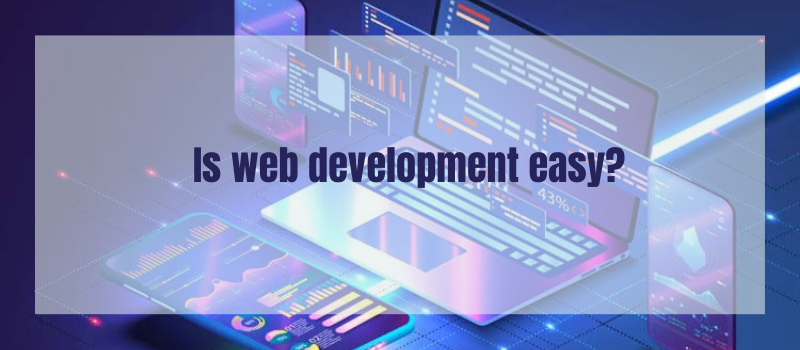Can I learn website development in just 1 Month? You’re in the right place. Through this personal experience of mine, we’ll learn the importance of learning web development. You’ve got a brilliant app idea, want to launch a website, or are just fascinated with the coding concept. And like most impatient yet ambitious folks, you wonder if it’s possible to go from a coding newbie to a legit web developer in just one short month. I’ve been there!
When I started tinkering with HTML and CSS, I naively thought I could master it in weeks. Boy, was I wrong? But you know what? That unrealistic mindset motivated me to dive headfirst into learning the basics, even if I soon realized that becoming a pro would take way more time and dedication.
If you’re eager to decode the world of web development ASAP, come along for an honest look at what you can (and can’t) cram into one month. I’ll map out what skills are involved, why you should even care to learn this stuff and give you tips to make the most out of your first 30 days. Sound good? Fasten your seatbelts, and let’s start this web development learning party!
Contents
- 1 Can I Learn Website Development In Just 1 Month?
- 2 What Exactly is Website Development?
- 3 Why Should You Consider Learning Web Development?
- 4 How Difficult is Learning Website Development?
- 5 Is It Realistic to Learn Web Development in Just 1 Month?
- 6 Tips for Learning Website Development in One Month
- 7 What Should You Do After Your Initial Month of Learning Web Dev?
- 8 FAQs
- 9 Conclusion
Can I Learn Website Development In Just 1 Month?
Can you gain basic website development skills in a month? Absolutely – with focus and dedication, you can pick up HTML, CSS, and elementary JavaScript fundamentals faster than you think. But mastering the broad range of expertise needed for professional-grade website creation and coding complex interactions is just not realistic in 30 days.
Approach one month as a strong kickstart to your coding journey, not an endpoint. Stay patient, keep practicing beyond the month, and you’ll continue progressing towards your web dev dreams.
What Exactly is Website Development?

Web development is the broad term for the work involved in creating websites and web applications. It encompasses several disciplines:
Front-end Web Development
The front end refers to the part of a website or app that users interact with directly. Front-end developers are responsible for the site layout, styling, and functionality using HTML, CSS, and JavaScript code. They make sure the site looks great and works seamlessly on all devices.
Back-end Web Development
The back end is the behind-the-scenes infrastructure that powers the front end. Back-end developers use languages like PHP, Ruby, Python, and .Net to build the application logic, databases, servers, and APIs needed to run the site.
In summary, web development combines front-end and back-end skills to build a whole digital experience stack. To have web dev skills, you need to know the core languages – HTML, CSS, JavaScript.
Why Should You Consider Learning Web Development?
There are many good reasons to learn web development:
High Demand for Skills and Career Opportunities
The Bureau of Labor Statistics projects 13% job growth for web developers between 2020-2030, faster than average. As digital continues dominating, skilled web devs are highly sought after. Whether you want a full-time job or a freelance gig, web development skills can open doors.
The average salary for web developers ranges from around $70,000 for entry-level roles to $130,000+ for senior developers. Salaries have steadily increased with high demand.
New opportunities are emerging around web 3.0 technologies like blockchain, augmented reality, IoT devices and more. Adaptability is critical for future career growth.
Build Websites/Apps for Personal or Professional Use
Even if you don’t want a career change, having basic web dev chops lets you create personal websites or simple web tools. Many small businesses also appreciate DIY skills for building their sites versus paying an agency.
Flexible Remote Work Potential
Web developer roles often offer remote work options since you can do the job from anywhere with an internet connection. The flexibility makes it appealing if you want a career that allows travelling or working abroad.
So, if you’d like a promising career path or want more control over building digital products, web development is a great skill set to learn. The versatile opportunities make it worth considering.
How Difficult is Learning Website Development?

Building websites or web apps does involve learning some complex skills. Here’s a quick reality check on what’s required:
You Need Patience to Master Coding Fundamentals
The foundational languages like HTML, CSS, and JavaScript have a learning curve. It would help if you put in time to practice coding until the syntax and patterns feel natural. Most people take a few months to get comfortable with the basics.
Design Principles and Best Practices: Take Time to Learn
Beyond coding skills, you must learn the principles of good design and user experience. Skills like responsive design, accessibility, UI patterns, optimization, etc., allow you to develop professional-grade products. These take dedication to master.
The bottom line is that quality web development requires a mix of technical coding skills plus an artistic eye for design, layout, and user interactions. Give yourself several months to begin feeling competent with the breadth of knowledge required.
You May Also Read Is web development easy?
Is It Realistic to Learn Web Development in Just 1 Month?
Given the learning curve, you may wonder if it’s realistic to try picking up web development basics within a short timeframe, like one month. Here are some thoughts on what’s feasible:
You Can Gain Basic Familiarity
If you’re new to web development, one month of intensive learning will give you a taste of what’s involved and familiarity with some fundamentals. Think basic CSS layouts, simple JavaScript interactions, and HTML page structure. It can be an excellent introduction.
Don’t Expect Deep Expertise
Conversely, don’t expect to gain senior-level proficiency in just a month. Skills like complex JavaScript applications, back-end programming, advanced performance optimization, etc., can take years to polish. Keep your expectations aligned.
Depends How Much Time You Spend
If you can devote most of your free time in a month to learning web dev, you can progress faster. But fitting it in around a busy job may limit how far you get. The time investment impacts the pace.
The consensus is that one month is enough to dip your toes in and get excited about web development. But you’ll need to spend several more months practising and building projects to have job-ready skills. Be patient with yourself when getting started.
Tips for Learning Website Development in One Month
If you’re up for the challenge, here are some tips to make the most out of one month:
Focus on HTML, Basic CSS, and JavaScript
For foundational knowledge, spend most of your time learning HTML for markup, CSS for styling sites, and basic JavaScript for interactivity. These are the core building blocks.
Use Free Online Tutorials and Courses
Resources like freeCodeCamp, Codecademy, MDN Web Docs and more offer interactive code lessons. Take advantage!
Build Small Websites and Apps
Applying your skills with practice projects is vital for learning. Build simple landing pages, calculators, to-do lists, or whatever inspires you.
Get Feedback from Experienced Developers
Having an experienced web dev review your code gives invaluable feedback. Consider joining a mentorship program or online community.
One month can solidly introduce you to web development if you stay focused. Just don’t stop there!
What Should You Do After Your Initial Month of Learning Web Dev?
Once you complete an intro month, here are some next steps to keep the momentum going:
Keep Practicing and Building Personal Projects
More practice and project experience cement what you’ve learned. Keep expanding your skills.
Consider a Coding Bootcamp for Comprehensive Training
Bootcamps like General Assembly offer complete web dev curriculums if you want guided structure.
Look for Internships or Junior Developer Roles
Getting real-world experience accelerates learning. A supportive company may help you skill up.
Stay Engaged with Developer Communities
Keep learning from experts through sites like Stack Overflow and local meetups.
The key is not stopping at one month but using it as a launch pad for continuous skill building. Stay patient and keep coding!
Here are some final vital points:
- With full-time effort, one month allows you to gain basic familiarity with HTML, CSS and JavaScript fundamentals. It can spark your interest and show you what web development entails.
- However, allowing only one month is unrealistic for reaching an employable skill level. Expert skills like complex programming, back-end systems, security, etc., require months or years more of study and practice.
- Learning web development is an ongoing journey. Use your first month as a springboard to constantly improve through training, projects, courses, and collaboration. Patience and persistence will pay off.
- Consider one month a taster while setting a longer-term timeline, like six months or a year, to gain expertise for a new career. Download some time-tracking apps and get ready for an exciting learning adventure.
FAQs
Q1: How long does it take to learn web development?
Gaining intermediate skills takes 6-12 months of consistent studying and building projects. Expect reaching an advanced level to take 2+ years.
Q2: Is web development a promising career?
Yes, it’s a promising career with solid demand, good salary potential, remote work options and opportunities to build valuable products.
Q3: What coding language is best to learn first?
HTML and CSS are the best languages, as they are fundamental building blocks for any web project.
Q4: Can I learn web development on my own?
You can learn through self-study using online tutorials, courses and documentation. Building projects is vital.
Q5: Is web development accessible to learn?
No, it has a significant learning curve. Patience and consistent practice over months/years are required to gain expertise.
Q6: Do I need a computer science degree?
No, many successful professional developers are self-taught or have undergone coding bootcamps.
Conclusion
Learning website development is a challenging yet rewarding adventure. After reading this post, you now understand what’s involved in mastering these in-demand skills within a short timeframe.
The key takeaways are that one month allows you to get excited about coding and gain basic proficiency while reaching an expert level takes more dedicated time and practice. Don’t let the initial learning curve discourage you! Stay motivated by focusing on the many career and personal benefits website development skills can offer.
Start small, be patient with yourself, and keep building. The future is bright for those looking to learn web development – the only question is, how far are you willing to push yourself to succeed? Start your engines and get coding today!
Learn More About Our Web Development Services!



